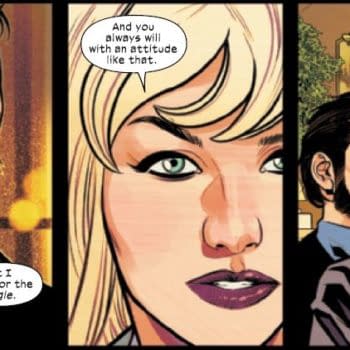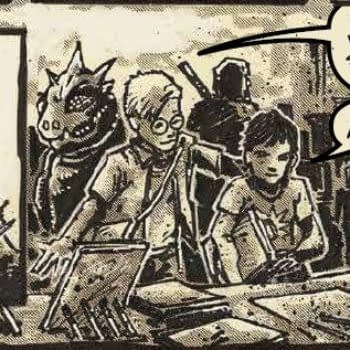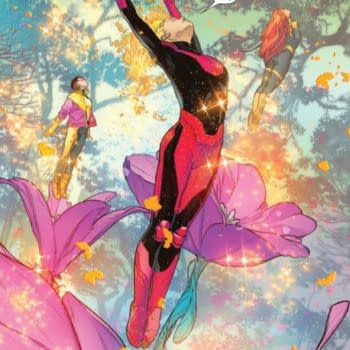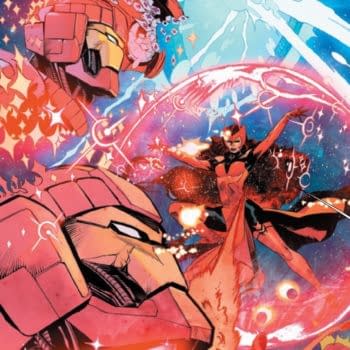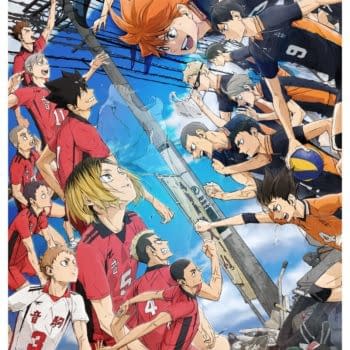Posted in: Comics | Tagged: Comics, entertainment, light novels, manga, Yen Press
The Spring Yen Press Light Novel Roundup – Look! It Moves! by Adi Tantimed
Adi Tantimedh writes,
Yen Press has been nice enough to send us comp copies of their Spring books, and since their manga are covered amply by the anime press, I thought I'd give a rundown of the light novels. Light novels are prose series that are, in effect, Young Adult genre novels. They've been increasingly popular in Japan and Yen Press are jumping in the deep end with bring them out in full force. A few years ago, Del Rey, when they began to license manga from Kodansha, Japan's biggest publisher, also translated a small number of light novels. But without any proper marketing, hardly anyone knew about them and sales were tiny. Now Yen Press is building on the popularity of specific anime series to gauge the potential sales of their original light novel versions.
When you think about it, light novels are cheaper to produce than manga. They're mainly prose with a few illustrations by popular aritsts to complement the stories. And lately, more and more popular light novels have been adapted into anime series, which then drives new fans to buy the original novels, same with popular manga. It's a normal trajectory now for a light novel series to have an anime, a manga and even a video game. Unlike Hollywood, anime adaptations of popuarl manga and light novels are usually very faithful because the original creators have final approval over story and art, and the publishers exercise control over the adaptations as well.
A Certain Magical Index Vol. 2 by Kazuma Kamachi mixes Science Fiction with magic as a luckless student of superscience finds himself the protector of a young nun whose body carries over a thousand magical texts that an order of evil sorcerers are after. The appeal of this series is obvious, the target audience is horny teenage boys with its fantasy of protecting a damsel in distress, as many manga and light novels tend to go. This series was popular enough to have a manga and anime, and a spinoff series, A Certain Scientific Railgun, in turn has its own manga and anime adaptations.
Accel World Vol. 3 by Reki Kawahara is the other novel series by the creator of the hugely popular Sword Art Online. In fact, it was his first professional series, and still ongoing next to Sword Art Online. It's another series based on games, which suggests Kawahara, like many other light novel authors, is an avid gamer. Here the hero is a fat kid who becomes a knight in shining armour in the virtual game he plays when the glamourous girl in school charges him with being her champion in the game to redeem her reputation and change the social hierarchy of the game world.
The Devil is a Part-Timer Vol. 1 by Satoshi Wagahara is another series that began life as a novel and got an anime and manga series. A raucous comedy about a demon lord who flees their magical kingdom after being defeated and end up in modern Japan with no powers, no money and no minions other than his fussy general that he has to share a tiny apartment with like a bickering gay couple. With no other prospects going for him, the Devil is forced to start from the bottom of the social ladder, he has no choice but to take an entry-level job at the local fast-food chain restaurant, intent on working his way up to eventual world domination. But till then, he's going to be Employee of the Month. It's a fun satire of both the fantasy genre and service industry workplace comedy.
Is It Wrong to Pick Up Girls in a Dungeon? Vol. 2 by Fujino Omori has, to my surprise, a second volume translated so soon after the first. And only two years after its original Japanese release. Only the Japanese would come up with this title without a clue that it might sound like a sleazy Fifty Shades BDSM novel. Being a Young Adult novel, it's a bit more innocent than that, even if it's aimed at horny teenage boys. It's about fantasy adventuring and dungeon-crawling as you might know from Dungeons & Dragons role-playing game. Set in a cod-medieval fantasy world where guilds are headed by gods from various pantheons, the story follows teenager Bell, an adventurer who's the sole member of the impoverished goddess Hestia as he tries to improve his adventuring skills and find a girlfriend.
Kingdom Hearts: The Novel by Tomoco Haenmaki is the prose adaptation of the popular Playstation video game where the teenage hero visits a kingdom populated by Disney where he teams up with Donald Duck and Goofy to save the world. Nearly every Japanese video game is about a kid saving the world, but this one has the added bonus of having Disney characters as your buddies. The only title on the list that originated as a video game before getting a prose and manga adaptation.
Log Horizon by Mamare Touno is, like Sword Art Online, another entry in the "trapped in an MMO game" subgenre of Science Fiction. This series, however, takes a different tact and deals with the characters deciding to create a functioning society within the MMO world, and what it takes to make a viable political and economic system, and the conflicts that arise that need to be dealt with collectively. It's deeper and more nuanced than Sword Art Online, and more mature in its emphasis on strategic thinking, politics and diplomacy. Interestingly, the first volume of the manga, also out now, faithfully adapts this first novel in the series. The anime series has already adapted quite far ahead in the novel series.
No Game No Life by Yuu Kamiya is an oddball Science Fiction comedy about a pair of brother and sister slackers who only care about games, any games, all kinds of games. When they' end up in an alien world where all conflicts are resolved through games, they're in heaven. As genius game players, they become the oddball saviours of the human race on this world because they know how to win. There's already an anime series and Seven Seas currently publish the manga adaptation.
Spice and Wolf Vol. 14 by Isuna Hasekura is the longest running light novel series Yen Press have, longer than the Haruhi Suzumiya novels. In some ways, it's the most unusual. On the surface, it's a pre-industrial fantasy at a time when the pagan gods were dying out and the Catholic church is gaining prominence. The hero is a traveling merchant joined by a wolf goddess of the harvest who takes on the form of a young girl. Under all the plots about thieves, corrupt business, conflicts with the Church and moe romance lurks lessons in economics, trading, investing and basic Capitalism. The whole series is Economics 101 in a furry disguise.
Sword Art Online: Fairy Dance Vol. 4 by Reki Kawahara is the conclusion of the second story arc of the novel series where the hero continues his journey in a new fantasy MMO to rescue his girlfriend. This arc is much less interesting and more sexist than the original arc that turned the series into a popular franchise, reducing the series' heroine from a strong female character into a damsel-in-distress for the entire arc. Many fans felt this arc derailed the series, but the next three arcs to correct the course of the series, but the core of the series stays the same: the fantasy of a smart, heroic gamer who knows the game systems inside-out to win and also gets all the girls. The second season of the anime adaptation ended with this arc.
Sword Art Online: Progressive Vol. 1 is a spinoff by the same author, focusing on alternate side stories featuring the supporting cast during the more popular setting of the first novels. It's a sign of the series' popularity that it has spinoffs, and even this spinoff has its own manga adaptation out now, also published by Yen Press.
The most striking thing about this range of light novels, and many others, is the extent that video games and online gaming have an influence on Japanese popular culture. Many have their entire world-building and plots based entirely on the conventions of role-playing games. This means that creators are not only avid gamers in Japan, but also draw much more direct influence from them for their stories than comics and screenwriters do in the West. Coupled with the fantasies that seek to empower geeks and teenage boys (and sometimes girls), light novels, manga and anime are all part of the same pop culture continuum in the way that Western geek pop culture is also currently becoming. It's interesting to see the parallels and note that Japan started doing that first, and how the West is now following that model since as an industry and a business, it makes perfect sense, since the more fans, the more books, TV shows, movies and tie-in sell. The anime fandom scene may be small in the West and not-quite mainstream, but it's a microcosm of what's still solidifying in the West and Hollywood. That's why I always keep an eye on Japan.
It's all in the words at lookitmoves@gmail.com
Follow the official LOOK! IT MOVES! twitter feed at http://twitter.com/lookitmoves for thoughts and snark on media and pop culture, stuff for future columns and stuff I may never spend a whole column writing about.
Look! It Moves! © Adisakdi Tantimedh















